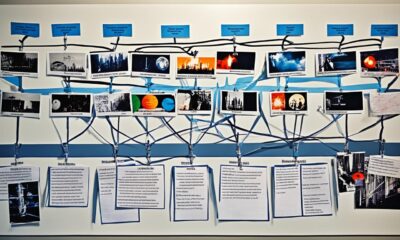Understanding Narcissism
10 Ways Narcissists Mask Their Boredom

Narcissists conceal boredom through self-promotion, seeking attention, stirring drama, false enthusiasm, and creating illusions of excitement. These tactics mask their emptiness and project importance. They engage in power plays, feign interest superficially, indulge excessively, and display superiority to deflect focus. By understanding these behaviors, one can navigate interactions wisely.
Key Takeaways
- Constant self-promotion for validation and attention.
- Seeking endless attention to distract from boredom.
- Stirring drama for excitement and control.
- Projecting false enthusiasm to manipulate and engage.
- Creating illusions of excitement through charm and grandiosity.
Constant Self-Promotion
Narcissists engage in constant self-promotion as a way to mask their boredom, seeking validation and attention. This behavior stems from their False Self, a facade they present to the world to cover up their inner emptiness.
Narcissistic mothers, for example, often exhibit this trait, constantly boasting about their achievements to create an illusion of self-importance. The lack of empathy in narcissists drives them to focus solely on themselves, disregarding the feelings of others.
By promoting themselves tirelessly, they attempt to fill the void within, feeding off the admiration and validation they receive from others. This cycle of self-promotion not only serves as a distraction from their boredom but also reinforces their False Self, making it harder for them to confront their true feelings.
Understanding this aspect of narcissistic behavior sheds light on the mechanisms they employ to maintain their inflated self-image at the expense of genuine connections with others.
Seeking Endless Attention

Seeking endless attention serves as a coping mechanism for individuals struggling with feelings of boredom and insecurity. Those with narcissistic personality disorder often engage in attention-seeking behaviors to mask their inner turmoil.
Constantly seeking admiration and validation from others allows them to uphold their facade of confidence and superiority, despite their underlying emptiness. By demanding endless attention, narcissists create a distraction from their inner feelings of boredom and lack of fulfillment.
This behavior helps them avoid facing their true selves and the uncomfortable realities they may be experiencing. The endless pursuit of attention from others serves as a temporary fix to their inner struggles, providing a fleeting sense of validation and importance.
Understanding the root cause of their attention-seeking tendencies can shed light on the deeper issues at play and may lead to healthier coping mechanisms for managing their boredom and insecurity.
Stirring Drama for Stimulation

To create excitement and stimulation in our lives, individuals with narcissistic tendencies often resort to stirring up drama. Beneath the surface, the narcissist needs constant validation and attention, which they might see as unattainable without creating chaos. By provoking conflicts and arguments, they try to alleviate their boredom and feel a sense of control and power. This behavior allows them to shift focus away from their inner emptiness and insecurity, masking these feelings with external turmoil.
Engaging in manipulation and gaslighting tactics, narcissists maintain a constant state of drama and stimulation around them. This cycle feeds into their need for attention and validation, driving them to continue seeking out conflicts and tension. By creating an environment filled with drama, they can distract themselves from facing their own insecurities and shortcomings. Understanding these patterns can help in identifying and setting boundaries with individuals who exhibit narcissistic behaviors.
Projecting False Enthusiasm

Pretending enthusiasm for activities or conversations they find boring, individuals with narcissistic tendencies often project false interest to manipulate and control others. They'd expect excessive compliments and exaggerated reactions, creating an illusion of engagement when, in reality, their interest is superficial. This behavior is a tool for maintaining power over those around them, as feigning excitement allows narcissists to steer interactions in their favor.
By faking interest in topics or events, they can keep the spotlight on themselves and orchestrate situations to serve their needs. This false enthusiasm serves as a distraction from their inner feelings of boredom and insecurity, helping them uphold the image of being engaging and charismatic. Understanding how narcissists mask their lack of genuine interest can empower individuals to see through these tactics and protect themselves from manipulation.
Creating Illusions of Excitement

In order to mask their boredom, narcissists often create illusions of excitement by feigning interest and showing exaggerated reactions in conversations or activities. They use charm, charisma, and grandiosity to maintain a façade of engagement. By pretending to be enthusiastic, they manipulate situations to appear entertained and captivated, even when internally disinterested.
Seeking novelty or engaging in thrill-seeking behaviors are common tactics to distract themselves and others from their boredom. These individuals may go to great lengths to fabricate a sense of excitement, all while their true feelings remain indifferent.
It's important to recognize these behaviors as attempts to cover up their lack of genuine interest. Understanding that these illusions of excitement are merely a smokescreen for their underlying boredom can help in dealing with narcissists who use this tactic. By staying aware of their strategies, one can navigate conversations and activities with a clearer perspective, avoiding being deceived by their false displays of enthusiasm.
Criticizing and Provoking

When observing how narcissists mask their boredom, a common tactic they employ is criticizing and provoking others to stir up reactions and attention. By nitpicking details and finding faults in others, they create a sense of excitement and control in otherwise mundane situations.
Intentionally picking fights or creating drama allows narcissists to divert attention from their inner emptiness and boredom. Provoking arguments helps them feel powerful and in charge, feeding their need for stimulation. Constantly seeking out flaws and instigating conflict are ways for narcissists to maintain a façade of engagement and interest while battling their own feelings of monotony.
Through criticizing and provoking, they redirect focus onto others, drawing attention away from their own lack of fulfillment. This behavior not only masks their boredom but also serves as a means to entertain themselves at the expense of others, showcasing their need for constant stimulation and validation.
Engaging in Power Plays

Engaging in power plays allows narcissists to exert dominance and control within their relationships, manipulating situations to maintain a sense of excitement and power. By creating drama, conflict, and chaos, narcissists keep those around them on edge and focused on their every move. These power plays serve as a distraction from their own inner emptiness and constant need for validation.
Through these tactics, narcissists effectively mask their boredom by drawing attention to themselves and steering the dynamics of their relationships. The manipulation involved in power plays gives them a sense of superiority and importance, fulfilling their desire for control and admiration.
In essence, power plays become a tool for narcissists to maintain a facade of interest and engagement while secretly battling their own feelings of monotony and dissatisfaction. By keeping others entangled in their web of power dynamics, they perpetuate a cycle of excitement and dominance that feeds their ego and conceals their underlying boredom.
Feigning Interest in Others

Feigning interest in others, narcissists often employ superficial questions and mimic active listening behaviors to create the facade of engagement. They may ask generic questions that do not explore deep into the other person's life, giving the appearance of interest without genuine curiosity. Through nods and eye contact, they pretend to be attentive, yet their focus remains on themselves. To the unsuspecting observer, these actions may seem like genuine interest, but in reality, they serve as tools for the narcissist to maintain control and feed their ego.
| Narcissists Feigning Interest | Description | Purpose |
|---|---|---|
| Superficial Questions | Lack Depth | Maintain Illusion of Engagement |
| Mimicking Active Listening | Nods, Eye Contact | Create Appearance of Attentiveness |
| Charm and Flattery | Illusion of Interest | Serve Ego and Control Purposes |
Escaping Through Excessive Pleasures

When narcissists seek to escape through excessive pleasures, they often exhibit hedonistic indulgence tendencies.
Overconsumption becomes a distraction from their underlying feelings of emptiness and dissatisfaction.
This behavior allows them to temporarily avoid confronting their inner insecurities and fears.
Hedonistic Indulgence Tendencies
Indulging in excessive pleasures is a common tactic narcissists use to escape boredom and fill their inner void. When seeking to mask their boredom through hedonistic indulgences, narcissists may engage in various behaviors, such as:
- Excessive partying and substance abuse to seek constant stimulation.
- Shopping sprees, gambling, or impulsive decisions for instant gratification.
- Overeating, promiscuity, or thrill-seeking activities to distract themselves.
- Attention-seeking behaviors and dramatic actions to gain validation.
- Manipulating others or creating drama to alleviate their inner emptiness.
These tendencies often serve as temporary distractions, providing a fleeting sense of excitement and satisfaction, but ultimately failing to address the deeper issues narcissists face.
Overconsumption as Distraction
Escaping through excessive pleasures, narcissists often resort to overconsumption as a distraction from their inner emptiness and dissatisfaction. This behavior stems from a desire to fill a void within themselves by seeking gratification from external sources.
By engaging in overconsumption of material goods or experiences, they temporarily alleviate feelings of boredom and inadequacy. However, this coping mechanism only provides short-term relief, leading to a cycle of constantly seeking stimulation to avoid facing their true emotions.
Over time, relying on excessive pleasures as a distraction can exacerbate their sense of emptiness and lack of fulfillment. It becomes essential for narcissists to address the root cause of their boredom and dissatisfaction rather than perpetuating a cycle of temporary escapism through overindulgence.
Masking Apathy With Superiority

To conceal their underlying apathy, narcissists often project an air of superiority and grandiosity in social interactions. This facade of superiority serves as a shield, hiding their true feelings of disinterest and boredom. Here are five ways narcissists mask their apathy with superiority:
- Engaging in attention-seeking behaviors, such as boasting about their accomplishments, to divert attention from their lack of genuine interest.
- Belittling others or criticizing them to shift the focus away from their own boredom and disengagement.
- Utilizing manipulation tactics like gaslighting or blame-shifting to distract from their inner emptiness.
- Presenting an arrogant and entitled persona to camouflage their disconnection from others while maintaining control.
- Seeking admiration and validation to fill the void of apathy within, using external praise to prop up their fragile self-image.
These tactics allow narcissists to uphold an illusion of superiority while concealing their true feelings of apathy and disinterest.
Frequently Asked Questions
What Do Narcissists Do When They Are Bored?
When we're bored, narcissists often turn to attention-seeking behaviors like excessive social media posts or creating drama. Seeking admiration and validation is common; they may flirt or start conflicts. Grandiose fantasies help escape boredom and feelings of insignificance.
Risky actions like overspending or substance abuse are prevalent. Manipulating others for entertainment or control is another tactic. These behaviors allow narcissists to mask their boredom and maintain a sense of power.
How Long Before a Narcissist Gets Bored?
We usually see narcissists getting bored fairly quickly, often seeking fresh sources of admiration and excitement. They might engage in risky behaviors or manipulate people to maintain interest. The cycle of personas and interests helps stave off monotony.
Their charm and charisma often mask their boredom well. It's common for a narcissist to grow restless and seek out new ways to entertain themselves within a short timeframe.
How Do You Make a Narcissist Bored of You?
When making a narcissist bored of you, it's crucial to set boundaries and prioritize your own interests. By not engaging in mundane conversations or seeking their validation, you can diminish their interest.
Avoid reacting emotionally to their manipulations and focus on showing independence. Keeping interactions minimal and showcasing self-sufficiency will gradually reduce their enthusiasm.
What Silence Does to a Narcissist?
When a narcissist faces silence, it strips away their usual validation and attention. This absence exposes their inner insecurities and fears, making them uncomfortable.
Their grandiose facade weakens without external stimulation, revealing the shallow nature of their relationships. To regain control, they might resort to manipulation or provocation.
Understanding how silence affects a narcissist can provide insight into their behavior patterns and motivations.
What Are Some Common Behaviors of Bored Narcissists?
Some common behaviors of bored narcissists include seeking constant admiration and attention, taking unnecessary risks to feel alive, engaging in impulsive behaviors, and manipulating others for their own amusement. The truth is that their need for stimulation often leads to destructive and selfish actions.
Conclusion
To sum up, it's crucial to recognize the various ways narcissists mask their boredom in order to protect ourselves from falling into their manipulative traps. Remember, 'all that glitters isn't gold,' so don't be fooled by their flashy facade.
By staying vigilant and setting boundaries, we can safeguard our mental and emotional well-being from those who seek to use us for their own amusement. Stay aware, stay strong, and prioritize your own happiness above all else.
Understanding Narcissism
Narcissistic Sibling's Manipulative Tactics Revealed
Beware of the intricate web of manipulation spun by narcissistic siblings, unraveling their covert strategies will empower you to reclaim control of your relationships.

As we navigate the intricate web of family dynamics, we uncover the hidden facets of a narcissistic sibling's manipulative arsenal. Like a skilled puppeteer pulling invisible strings, they wield tactics that can leave us questioning our reality and our worth.
But what lies beneath these calculated maneuvers, and how can we shield ourselves from their emotional onslaught?
Join us as we unravel the layers of manipulation and control employed by narcissistic siblings, shedding light on their covert strategies and empowering ourselves to reclaim our agency within these challenging relationships.
Key Takeaways
- Narcissistic siblings use manipulation for control.
- They employ cycles of idealization and devaluation.
- Gaslighting confuses and disorients victims.
- Isolation tactics are common in narcissistic relationships.
Identifying Manipulative Behavior Patterns
When navigating a relationship with a narcissistic sibling, recognizing manipulative behavior patterns is crucial for safeguarding your emotional well-being. It's common for narcissistic siblings to manipulate situations to serve their own needs, often at the expense of others. They may use tactics like guilt-tripping, gaslighting, or playing the victim to control and influence those around them.
Gaslighting Techniques and Their Impact

Navigating a relationship with a narcissistic sibling requires an understanding of gaslighting techniques and their profound impact on emotional well-being. Gaslighting, a manipulative tactic used by narcissists, can leave one feeling confused, doubting their reality, and questioning their sanity.
The effects of gaslighting can be long-lasting and detrimental to mental health. Here are three key points to consider about gaslighting:
- Gaslighting undermines your sense of reality and self-worth.
- It can lead to increased anxiety, depression, and feelings of isolation.
- Gaslighting erodes trust in oneself and others, making it challenging to form healthy relationships.
Emotional Blackmail and Guilt Tripping
Understanding the manipulative tactics of emotional blackmail and guilt tripping is crucial when dealing with a narcissistic sibling. These tactics are designed to manipulate your emotions, making you feel responsible for their happiness and well-being.
Emotional blackmail involves threats, manipulation, and coercion to make you comply with their wishes, while guilt tripping plays on your sense of guilt and obligation. It's essential to recognize these tactics and set boundaries to protect yourself.
Exploiting Vulnerabilities for Control
Recognizing and addressing how a narcissistic sibling manipulates vulnerabilities for control is essential in safeguarding your emotional well-being and autonomy. When dealing with a manipulative sibling, it's crucial to be aware of their tactics and protect yourself.
Here are some ways a narcissistic sibling may exploit vulnerabilities for control:
- Gaslighting: They may distort reality to make you doubt your perceptions and memories.
- Playing on Emotions: They might use your emotions against you to gain power and influence.
- Undermining Confidence: By consistently criticizing or belittling you, they aim to weaken your self-esteem.
Understanding these manipulative tactics can help you respond effectively and set boundaries to protect yourself from their harmful behavior.
Playing the Victim Card Strategically
When encountering a narcissistic sibling, one must remain vigilant of their strategic use of portraying themselves as the victim to manipulate situations and garner sympathy. It's essential to recognize that this tactic is a calculated move aimed at eliciting compassion and shifting blame onto others.
By playing the victim card, the narcissistic sibling seeks to manipulate emotions and control the narrative to suit their agenda. This behavior can be emotionally draining and confusing, leaving those around them feeling guilty or responsible for their supposed suffering.
It's crucial to maintain clarity and boundaries when faced with such manipulative tactics, ensuring that one's emotional well-being is protected and not compromised by the narcissistic sibling's strategic victimization.
Using Sibling Relationships for Personal Gain

Navigating a relationship with a narcissistic sibling can reveal how they strategically exploit familial connections for their personal gain.
- Financial Exploitation: They may guilt-trip or manipulate siblings into giving them money or resources.
- Emotional Blackmail: Using emotional vulnerabilities to make siblings feel obligated to meet their demands.
- Playing Favorites: Pitting siblings against each other to fulfill their own needs while causing division within the family.
Understanding these tactics can help siblings recognize and protect themselves from being used for the narcissistic sibling's benefit. Setting boundaries and seeking support are essential in maintaining a healthy relationship dynamic and preventing further exploitation.
Frequently Asked Questions
How Can One Effectively Confront a Narcissistic Sibling About Their Manipulative Behavior Patterns Without Escalating the Situation?
When addressing a narcissistic sibling's manipulative behavior, we must approach with caution and empathy. Setting clear boundaries, practicing self-care, seeking support, and avoiding power struggles can help in confronting them effectively.
What Are Some Long-Term Consequences of Gaslighting Techniques on the Victim's Mental Health and Well-Being?
Gaslighting techniques have severe long-term consequences on the victim's mental health and well-being. Constant manipulation can lead to self-doubt, confusion, and a distorted sense of reality.
Victims may struggle with trust, anxiety, and depression due to the emotional abuse endured. Gaslighting erodes self-esteem and can cause lasting trauma.
Recognizing these effects is crucial in supporting survivors and helping them heal from the psychological harm inflicted by manipulative tactics.
How Can Someone Recognize When They Are Being Emotionally Blackmailed or Guilt-Tripped by a Narcissistic Sibling?
When we're dealing with emotional blackmail or guilt-tripping from a narcissistic sibling, it's crucial to recognize the manipulation tactics being used.
Watch for signs like excessive guilt, fear, or obligation in their requests. They may use threats, intimidation, or playing the victim to control your actions.
Trust your instincts, set clear boundaries, and seek support from others to navigate these challenging dynamics with care for your well-being.
What Are Some Common Vulnerabilities That Narcissistic Siblings Exploit in Order to Maintain Control Over Their Victims?
We understand the common vulnerabilities that narcissistic siblings exploit to maintain control over their victims. These manipulative individuals often prey on our insecurities, seeking to erode our self-esteem and self-worth.
How Can One Differentiate Between a Genuine Display of Vulnerability From a Narcissistic Sibling and a Manipulative Tactic Used for Personal Gain?
When trying to differentiate between a genuine display of vulnerability and a manipulative tactic from a narcissistic sibling, we must tread carefully.
Sometimes, what appears as vulnerability may actually be a ploy to gain our trust and control us.
It's crucial to observe patterns of behavior over time and assess if their actions align with their words.
Trust your instincts and seek support from others to gain perspective on the situation.
Conclusion
As we unravel the tangled web of a narcissistic sibling's manipulative tactics, we must remember that we hold the key to our own protection and well-being. Like skilled navigators on stormy seas, we can set boundaries and seek support to weather the manipulation and emerge stronger than before.
Let's anchor ourselves in self-awareness and resilience, steering clear of the treacherous waters of their deceit. Together, we can chart a course towards healing and empowerment.
Our Content Strategist, Jordan, has a knack for deciphering the digital landscape to determine what our audience seeks. With a foundation in behavioral science and digital marketing, Jordan crafts our content strategy, ensuring that our topics are relevant, research-based, and resonant. Their strategic approach helps Narcissistic Man reach hearts and minds across the globe.
Covert Narcissist
What Makes a Covert Narcissist Different from an Avoidant?
Analyze the intricate behaviors of a covert narcissist or avoidant individual, unraveling the fine line between self-absorption and emotional distance.

The saying ‘actions speak louder than words’ is particularly relevant when differentiating between a covert narcissist and someone with avoidant tendencies within the realm of character traits. The specific behaviors exhibited by individuals with these personality types often cause uncertainty regarding their true motivations and intricate emotions.
As we navigate through the intricate web of characteristics and relational patterns associated with these traits, a deeper understanding of the driving forces behind each persona unveils a fascinating journey into the complexities of human behavior.
Key Takeaways
- Covert narcissists manipulate through gaslighting, lack empathy, and have fragile self-esteem.
- Avoidant individuals fear rejection, struggle with intimacy, and have difficulty expressing emotions.
- Differentiate between covert narcissists and avoidant individuals to navigate relationships effectively.
- Setting boundaries and practicing self-care are crucial in managing interactions with these individuals.
Understanding Covert Narcissistic Behaviors
In understanding covert narcissistic behaviors, it's crucial to recognize the subtle manipulation tactics employed by individuals who exhibit this personality trait. Covert narcissists often display an avoidant attachment style characterized by a strong need for admiration and a lack of empathy towards others. This attachment style stems from underlying feelings of inadequacy and a fragile self-esteem, leading them to seek validation through controlling and manipulating others.
Individuals with covert narcissism may use tactics such as gaslighting, where they distort reality to make their victims doubt their own perceptions and memories. By eroding their victim's sense of reality, covert narcissists gain power and control over them. This manipulation is a key feature of their narcissistic behavior, allowing them to maintain a facade of superiority and self-importance.
Understanding the interplay between avoidant attachment styles and narcissism is crucial in identifying and dealing with covert narcissistic behaviors. By recognizing these subtle manipulation tactics, individuals can better protect themselves from falling victim to the harmful effects of covert narcissists.
Signs of Avoidant Personality Traits

Having understood the manipulation tactics of covert narcissists, it's imperative to recognize the signs of avoidant personality traits that often accompany such behaviors. Avoidant individuals may exhibit the following characteristics:
- Avoidance of intimacy and emotional closeness in relationships.
- Fear of rejection and low self-esteem leading to social withdrawal.
- Difficulty expressing emotions and reluctance to seek help or support.
- Preferring solitary activities and avoiding social interactions.
These traits can stem from various factors, including childhood attachment patterns. Individuals with avoidant attachment styles may struggle with forming secure emotional connections due to past experiences. This can lead to a tendency to withdraw from relationships to protect themselves from perceived rejection or vulnerability.
Understanding these signs can help differentiate between covert narcissistic behaviors and avoidant personality traits, shedding light on the complexities of interpersonal dynamics. Furthermore, recognizing these patterns can aid in addressing underlying issues and fostering healthier relationships.
Impact on Relationships
The impact of avoidant personality traits on relationships can manifest in various ways, affecting both individuals involved. Avoidant individuals often struggle with forming secure attachments, which can lead to challenges in establishing and maintaining healthy adult relationships. Let's delve into the specific impacts on relationships through the table below:
| Impact on Relationships | Description |
|---|---|
| Difficulty with Intimacy | Avoidants may have difficulty opening up emotionally, leading to a lack of intimacy in relationships. |
| Fear of Rejection | Due to their fear of rejection, avoidant individuals may push partners away or avoid commitment altogether. |
| Communication Issues | Avoidants often struggle with effective communication, leading to misunderstandings and conflicts in relationships. |
Understanding these impacts is crucial in navigating relationships with individuals exhibiting avoidant traits. It's important to differentiate between avoidant behaviors and narcissistic personality disorder, as the underlying motivations and dynamics in relationships can vary significantly.
Differentiating Covert Narcissists and Avoidant Individuals

Upon examining the distinct characteristics of covert narcissists and avoidant individuals in relationships, it becomes evident that their behaviors and underlying motivations diverge significantly. When differentiating between covert narcissists and avoidant individuals, several key points emerge:
- Covert narcissists excel at masking their true intentions, seeking admiration and control, while avoidant individuals are more inclined to shun intimacy due to fear of rejection.
- Covert narcissists often employ false humility to garner trust and sympathy, whereas avoidant individuals may struggle with self-esteem and play down their accomplishments.
- Covert narcissists actively seek attention and manipulate situations to be the center of focus, while avoidant individuals prefer to evade attention and remain in the background.
- Covert narcissism is characterized by an unquenchable thirst for admiration and a tendency towards manipulation, whereas avoidant individuals harbor a deep-rooted dread of rejection and encounter difficulties in establishing intimate connections.
Understanding these distinctions can aid in recognizing and navigating relationships with individuals who exhibit traits of either covert narcissism or avoidance.
Coping Strategies and Setting Boundaries
To effectively navigate relationships with individuals displaying traits of covert narcissism or avoidance, implementing and maintaining clear boundaries is essential. When dealing with covert narcissists or avoidant individuals, establishing boundaries helps protect against manipulation and emotional harm.
It's crucial to clearly communicate your limits and expectations to maintain a healthy dynamic. Additionally, practicing coping strategies such as self-care, assertiveness, and seeking support from trusted individuals like friends, family, or therapists can aid in managing interactions with these personality types.
Prioritizing self-care activities that bring joy and fulfillment can help in maintaining emotional well-being. Learning to assertively express needs and feelings without fear of manipulation is key in setting boundaries with covert narcissists or avoidant individuals.
Limiting contact with these individuals when possible can also safeguard emotional health and reinforce boundaries. By incorporating these coping strategies and setting clear boundaries, one can navigate relationships with covert narcissists or avoidant individuals more effectively.
Frequently Asked Questions
Am I Avoidant or Narcissist?
We often question our behavior and tendencies, wondering if we fall into certain psychological categories. It's natural to reflect on our actions and personalities, seeking to understand ourselves better.
Identifying whether we exhibit avoidant or narcissistic traits can provide insight into our emotional patterns and relationships. Self-awareness is a key step in personal growth and development, allowing us to address areas where we may need to make positive changes.
What Can Be Mistaken for Covert Narcissism?
When examining behaviors that can be confused with covert narcissism, it's crucial to consider traits like introversion, shyness, or social anxiety. These characteristics may manifest similarly to covert narcissistic tendencies, such as avoiding social interactions or seeking validation through subtle means.
Understanding the nuances between these traits is essential in accurately identifying covert narcissism and differentiating it from other personality traits or disorders.
What Are the Red Flags of a Covert Narcissist?
When assessing potential red flags of covert narcissism, observing patterns of behavior is crucial. Look for signs of manipulation, lack of empathy, grandiosity, and a constant need for admiration.
Pay attention to how they interact with others, especially in social settings or when faced with criticism. Keep an eye out for subtle but persistent displays of entitlement and a tendency to exploit others for personal gain.
These behaviors can indicate underlying narcissistic traits.
What Hurts a Covert Narcissist the Most?
Criticism or rejection can deeply wound individuals who seek external validation, control, and admiration.
Failure to manipulate or threats to their grandiose fantasies can also trigger intense hurt.
Such individuals may struggle with feelings of inferiority, invisibility, and a fragile self-image.
Understanding these vulnerabilities can shed light on what truly affects them at their core.
Is the Behavior of a Covert Narcissist Related to Their Constant Illness?
The covert narcissist’s constant sickness may be a manipulation tactic to garner sympathy and attention. By portraying themselves as perpetually unwell, they seek to control others’ perceptions and elicit constant care and attention. This behavior aligns with their need for admiration and validation, perpetuating their narcissistic traits.
Conclusion
In conclusion, navigating relationships with individuals exhibiting covert narcissistic behaviors or avoidant attachment can be challenging. It's like walking a tightrope, balancing between their need for validation and fear of intimacy.
Setting boundaries and practicing self-care are crucial in maintaining healthy interactions with these personality types. Remember, understanding their underlying motivations can help in managing expectations and protecting your emotional well-being.
Chris brings a wealth of knowledge and personal experience to the role of Expert Author. With a focus on narcissistic personality disorder and recovery processes, Chris’s articles offer a mix of expert analysis, personal anecdotes, and actionable advice. Their work enriches our platform with depth, authenticity, and a perspective that resonates with those who have experienced narcissism firsthand.
Narcissism Test
Discover Your Inner Narcissist: You Quiz
Intrigued to uncover hidden traits? Take the 'How Narcissist Are You Quiz' and delve into the spectrum of narcissistic tendencies.

Have you ever thought about how self-awareness can shed light on different aspects of our personalities in our everyday interactions? Do you ever wonder how your level of self-reflection compares to that of others?
The 'How Narcissist Are You Quiz' unveils a spectrum of narcissistic tendencies that might surprise you. Let's explore how this quiz can offer a glimpse into our psyche and potentially challenge our perceptions of self-image.
Key Takeaways
- Online quizzes are not diagnostic tools for narcissistic personality disorder.
- Self-reflection allows introspection and analysis of actions, thoughts, and emotions.
- Analyzing conduct provides valuable insights and fosters healthier relationships.
- Seek guidance from mental health professionals for understanding and addressing tendencies.
Understanding Narcissism Through a Quiz
Exploring narcissism through a quiz can provide insights into the traits associated with narcissistic personality disorder. Narcissistic traits such as grandiosity, lack of empathy, and manipulation are often fundamental aspects of this disorder. By engaging with a narcissism quiz, individuals may gain a better understanding of these characteristics and how they manifest in their own behavior.
While such quizzes can serve as a preliminary screening tool, it's essential to recognize their limitations. Online quizzes aren't diagnostic tools and shouldn't be solely relied upon for a definitive diagnosis of narcissistic personality disorder. Instead, they can prompt individuals to reflect on their behaviors and seek further evaluation from mental health professionals if necessary.
To truly comprehend the complexities of narcissistic personality disorder, one must undergo a comprehensive assessment by a qualified specialist. Seeking professional help is crucial for an accurate diagnosis and the development of an appropriate treatment plan tailored to the individual's specific needs and circumstances.
Self-Reflection on Narcissistic Behaviors

After considering the limitations of online quizzes in diagnosing narcissistic personality disorder, it becomes imperative to engage in self-reflection on our own behaviors that may align with narcissistic traits. Self-reflection allows us to introspect and analyze our actions, thoughts, and emotions for signs of narcissistic tendencies. To aid in this process, a structured approach can be helpful. The table below outlines key behaviors associated with narcissistic personality disorder for self-assessment:
| Narcissistic Behavior | Description | Self-Reflection |
|---|---|---|
| Grandiosity | Exaggerated sense of self-importance | Have I displayed an inflated ego? |
| Lack of Empathy | Difficulty understanding others' feelings | Have I been insensitive to others' emotions? |
| Need for Admiration | Constant seeking of praise and admiration | Do I constantly seek validation from others? |
| Sense of Entitlement | Belief in special treatment and privileges | Have I expected special treatment in situations? |
Analyzing our conduct through this lens can provide valuable insights into our personalities and help in fostering healthier relationships.
Exploring Narcissistic Tendencies Together
Together, we'll delve into the manifestations of narcissistic tendencies within interpersonal relationships to enhance our understanding and foster a supportive environment for growth.
When exploring narcissistic behaviors in relationships, it's crucial to distinguish between normal self-interest and the traits associated with Narcissistic Personality Disorder (NPD). Individuals with NPD often exhibit a grandiose sense of self-importance, a constant need for admiration, and a lack of empathy for others. These characteristics can significantly impact how they interact with those around them, leading to strained relationships and emotional distress for both parties involved.
In today's digital age, social media platforms can amplify narcissistic tendencies, providing individuals with NPD a stage to seek validation and attention on a broader scale. The instant gratification and validation received through likes, comments, and followers can fuel their narcissistic traits, reinforcing their belief in their superiority and entitlement.
Assessing Your Narcissistic Traits

Within interpersonal relationships, understanding and recognizing one's narcissistic traits is essential for fostering personal growth and maintaining healthy dynamics. When assessing your narcissistic tendencies, it's crucial to approach the evaluation with a reflective and open mindset. Here are some key points to consider:
- Causes of Narcissistic Personality: Delve into the root causes that may have contributed to the development of narcissistic traits, such as childhood experiences or past relationships.
- Consulting a Mental Health Professional: Seeking guidance from a mental health professional can provide valuable insights and support in understanding and addressing narcissistic tendencies.
- Inflated Sense of Self-Importance: Reflect on instances where you may have exhibited an inflated sense of self-importance or a constant need for admiration from others.
- Impact on Interpersonal Relationships: Evaluate how your narcissistic traits impact your relationships with others and consider the feedback you receive from those around you.
- Self-Reflection and Growth: Engage in self-reflection to identify areas for personal growth and work towards cultivating healthier relationship dynamics.
Insights Into Your Personality: The Narcissism Quiz
The Narcissism Quiz provides a structured assessment tool to evaluate narcissistic behaviors and offer insights into one's personality. By answering a series of multiple-choice questions that reflect narcissistic tendencies, individuals can gain a better understanding of their own behavior patterns.
This quiz isn't a diagnostic tool for Narcissistic Personality Disorder (NPD) but can help determine whether certain traits align with narcissistic characteristics inspired by Greek mythology.
The results of the quiz are anonymous, allowing participants to reflect on their responses without fear of judgment. It's essential to approach the findings with an open mind and consider seeking guidance from a mental health professional if concerns about narcissistic traits arise.
Frequently Asked Questions
How Do You Check if You Are a Narcissist?
We assess narcissistic tendencies by reflecting on our behaviors, thoughts, and interactions with others. Observing how we prioritize our own needs over those of others, seek excessive admiration, or lack empathy can provide insights.
Engaging in self-reflection, seeking feedback from trusted individuals, and considering professional evaluation are valuable steps in evaluating potential narcissistic traits.
Awareness and willingness to address these aspects can be crucial for personal growth and healthier relationships.
What Is the One Question to Identify a Narcissist?
We can identify a potential narcissist by asking if they believe they're more special or unique than others. A resounding 'yes' to this question may indicate narcissistic tendencies.
It's important to distinguish between healthy self-esteem and exaggerated self-importance. However, this question alone isn't a definitive diagnosis of narcissistic personality disorder.
Seeking a professional evaluation from a mental health expert is crucial for an accurate assessment.
What Words Can Destroy a Narcissist?
We've explored how criticism, rejection, ignoring, accountability, and empathy can deeply affect a narcissist. These words have the power to pierce through their facade of superiority and self-centeredness, challenging their fragile ego and sense of self-worth. Understanding these triggers can help us navigate interactions with narcissistic individuals more effectively, promoting healthier relationships and boundaries.
It's crucial to approach such situations with empathy and caution, recognizing the complexities at play.
Can a Narcissist Cry Easily?
Yes, narcissists can cry, but it's typically not genuine. Their tears often serve a manipulative purpose, such as to elicit sympathy or control others. When they do cry, it's usually driven by self-pity or to further their own agenda.
These emotional displays are short-lived and quickly revert back to their self-centered focus.
It's essential to recognize that not all individuals who cry easily exhibit narcissistic traits, as crying is a normal and healthy response.
Conclusion
In conclusion, taking the 'How Narcissist Are You Quiz' can provide valuable insights into your level of narcissism.
It's important to remember that self-awareness is key to personal growth and building healthy relationships.
Just like a mirror reflecting our inner selves, this quiz serves as a tool to help us understand and address our behaviors.
Remember, seeking professional help is always recommended for accurate diagnosis and treatment.
Our Content Strategist, Jordan, has a knack for deciphering the digital landscape to determine what our audience seeks. With a foundation in behavioral science and digital marketing, Jordan crafts our content strategy, ensuring that our topics are relevant, research-based, and resonant. Their strategic approach helps Narcissistic Man reach hearts and minds across the globe.
-

 How To Deal with Narcissism2 weeks ago
How To Deal with Narcissism2 weeks agoNarcissist Return Timeline: Factors & Predictions
-

 Covert Narcissist1 week ago
Covert Narcissist1 week agoThe Final Covert Narcissist Discard: Signs to Watch For
-

 Divorcing a Narcissist3 months ago
Divorcing a Narcissist3 months agoHealing Together: Support Groups for Narcissistic Abuse Survivors
-

 Covert Narcissist3 months ago
Covert Narcissist3 months ago10 Celebrities Who Display Covert Narcissist Behavior
-

 Narcissistic Cheating Patterns3 months ago
Narcissistic Cheating Patterns3 months agoUnveiling Habits: Cheating Narcissist at Home Post-Affair
-

 How To Deal with Narcissism4 weeks ago
How To Deal with Narcissism4 weeks agoOutsmarting a Narcissist in Court: Strategies to Beat Them
-

 Covert Narcissist1 week ago
Covert Narcissist1 week agoWhat Are the Signs of Covert Narcissist Stalking?
-

 How To Deal with Narcissism4 weeks ago
How To Deal with Narcissism4 weeks agoHow to Make a Narcissist Want You Sexually: A Step-by-Step Guide



















